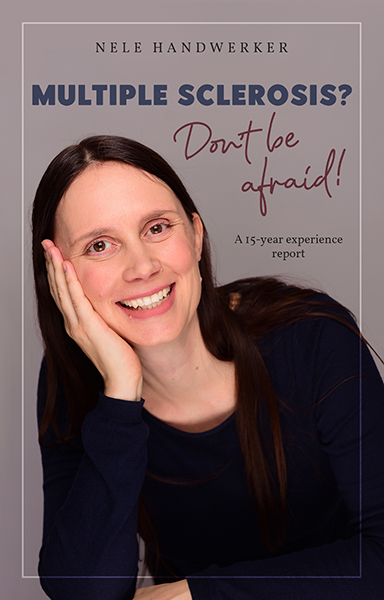Today I’m talking to Indu Khurana who received her MS diagnosis in 2017, approximately 25-years after her first symptoms. With her experience of up to 30 years as a psychotherapist and coach she tries to help people with multiple sclerosis to get through their battles with the disease. So that they get a better understanding of themselves – their mind and body and how the interact – and become more resilient.
Klicken Sie auf den unteren Button, um den Podcast zu laden.
Table of Contents
Indu Khurana's Background and Approach
Could you please introduce yourself and share a bit about your journey and background in supporting individuals with MS?
Hi I am Indu. I have been a Coach and Psychotherapist for around 25-30 years, but I only started to focus on helping people with MS in the last year.
Partly this was because I needed to go through my own journey with MS, and partly because I started my business full time only since September 2022 and felt strong enough to support others facing the battles, I had faced myself in previous years.
I was diagnosed with MS in 2017 but I think my first symptom was probably on my 31st birthday – 25 years before the diagnosis. Over those 25 years I researched a lot and tried to address the symptoms that didn’t have a diagnosis (or at least one that made sense) in natural and alternative ways – so I learnt a lot about myself, my body, our bodies and how everything interacts.

What inspired you to focus on empowering individuals living with MS and adopting a personalized approach to their well-being?
Starting my own business full time last year, I needed a focus for my business. I had worked in the British NHS for long enough and been a patient of it for long enough to know that the compartmentalization of the medical model does not work for the human being.
My way of practicing both Psychotherapy and Coaching has always been about seeing the whole individual in front of me. I am passionate about this as I feel that society has moved further and further away from seeing the individual – into a vague and compartmentalised view. The individualised way fits very well with MS and other autoimmune conditions because all these illnesses present so differently and individually in each person they inhabit.
Can you explain your unique, personalized approach in helping individuals with MS achieve their goals and overcome challenges?
My approach is personalized to the person in front of me because each person has a different context. I combine the wealth of knowledge I have gained through my Psychotherapy and Coaching trainings and experience, together with all the things I have learnt about in my own health journey to help others achieve their goals. As part of this work, we work together to find routes to them overcoming challenges they may be facing along the way – not just in relation to their symptoms. Because MS affects every part of our lives, not just our body.
Empowerment and Transformation
How do you support individuals in reclaiming balance and regaining control over their lives, especially when living with the challenges of MS?
Control comes from understanding what is happening and why. This forms the basis of our work. Once a client understands these things at an emotional and spiritual level as well as a physical level, we can then implement the appropriate strategy to address each challenge they face. Once they understand the context of their difficulties, it is much easier to find a point of balance in their life.
Could you provide some examples of the transformative journeys you've been a part of, highlighting the positive changes individuals have experienced?
I remember one client started with low mood, poor motivation – she was really struggling with fatigue and managing work as well as running her household.
So, we looked at her symptoms and what they meant if they were our body’s language. We then translated her body’s language into changes that could be made in various parts of her life – her home environment, the work environment. We also obviously looked at the small changes she could make for herself. But the 2 biggest areas we needed to work on was her mindset and the openness she needed to show with others about the impact of her illness. We have to look at the systems that a person functions within as well as everything else.
What are some common obstacles that people with MS face, and how do you help them overcome these challenges?
One of the biggest obstacles I believe that exists for people with MS is that generally, they have forgotten the language of their body. We spend quite a lot of time working on understanding this and learning to decipher this language.
Also, the poor understanding the general public has of MS is an issue. That’s why I share the minutiae of my difficulties in some of my social media posts – to raise awareness for the general public.
Another one, that is kind of related, is the lack of understanding from employers about how MS can affect people. So, I offer consultancy for the organisation so that they can work out reasonable adjustments suitable for the person rather than the person having to fit into the adjustments the business thinks they can make. I like to create a win-win situation.
Holistic Well-being and Resilience
You prioritize mental, emotional, spiritual, and physical well-being. How do these aspects come together in your approach to supporting individuals with MS?
There is no set formula for how they come together in my work.
However, I have learnt that if we do not pay attention to the emotional and mental wellbeing, then the physical generally declines. Once we start to address the emotional and mental issues, the physical follows.
My work with clients tends to flow across all these areas and across the various systems people live within. It flows according to where the client needs to go – prioritising what they need to address first. But each of these areas will get addressed in the flow of the work.
Can you share some strategies or practices that you recommend for cultivating resilience in the face of MS-related difficulties?
One of the best practices a person can do is to start journalling. This is much more powerful than it seems because it allows you to get some emotions out of you. Holding pent up emotions is not good for any of us, particularly when you have MS.
But having them written in black & white in-front of you gives us clues about what the context is that we need to think about and address. It is also quite a meditative activity – once you get into the routine. And it allows us to see patterns.
How do you help your clients identify and unlock their strengths, even when they might feel overwhelmed by their condition?
I ask them. I ask them to identify the learning from things. I remind them of what they have already achieved – until the mind-shift happens. We all need a little help.
Creating a Fulfilling and Successful Life Journey
What role does goal setting play in your approach to working with individuals with MS, and how do you help them set and achieve these goals?
It’s a key component of my approach. I may not always call it goal setting but that’s what we do. I ask them what they want to achieve and then we keep that in focus – at the centre of the work, so that we don’t lose connection with the ultimate goal.
How do you assist individuals in finding meaning and purpose in their lives, beyond the challenges of MS?
Great question. I guess once we deal with the other stuff – the emotion al reactions, the obstacles placed by their employer, the life difficulties, we can look at the learning. From the learning, the purpose and meaning starts to emerge organically. They find their true north.
Can you share a success story or a particularly inspiring experience from your work with someone living with MS?
See example above in 2b. The success was that when she completed work, she felt more hopeful. She had tools in her toolbox, she knew what helped for what, she was already putting things into her routine. She needed to embed these things down for herself.
Supporting Clients on Their Journey
What types of ongoing support and resources do you provide to individuals after they've started their transformative journey with you?
Individuals can come back to me for refreshers or top-ups. I am open to hearing from individuals about any follow-up resources they would find helpful, and I can create these in the future.
Quickfire Q&A Session
Complete the sentence: "For me, multiple sclerosis is...."
… yet another thing we can learn from.
Which website can you recommend for people living with MS in ????
MS-UK has a lot of resources. My own website is worth a visit from time to time as it grows – it is currently being built.
What development would you like to see in the field of multiple sclerosis in the next 5 years?
Being an idealistic person, I’d like to see a cure.
Farewell
Finally, what message of hope or encouragement would you like to share with individuals living with MS who might be listening to our podcast?
Keep monitoring your hope levels. If you find your hope drifting or declining, reach out for help.
And
Keep listening to your body.
How and where can interested people find you online?
You can find me on indukhurana.com and on LinkedIn.
Thank you for giving me this opportunity to share my thoughts here today.
Thanks a lot to Indu Khurana for sharing her tips, expertise and support in how to find individual ways through all the hurdles that come when receiving a diagnosis like multiple sclerosis. It is a lifelong journey and therefore it is very important to have stable mental health or try to get to that stage.
See you soon and try to make the best out of your life,
Nele
For more information and positive thoughts, subscribe to my newsletter for free.
Click here for an overview of all podcast episodes published so far.

And at many more places.
* This text contains affiliate links. This means that I get a small compensation if you buy the product recommended by me through the link. For you nothing changes in the price of the product. And it helps me to pay for the blog and to write new posts.










